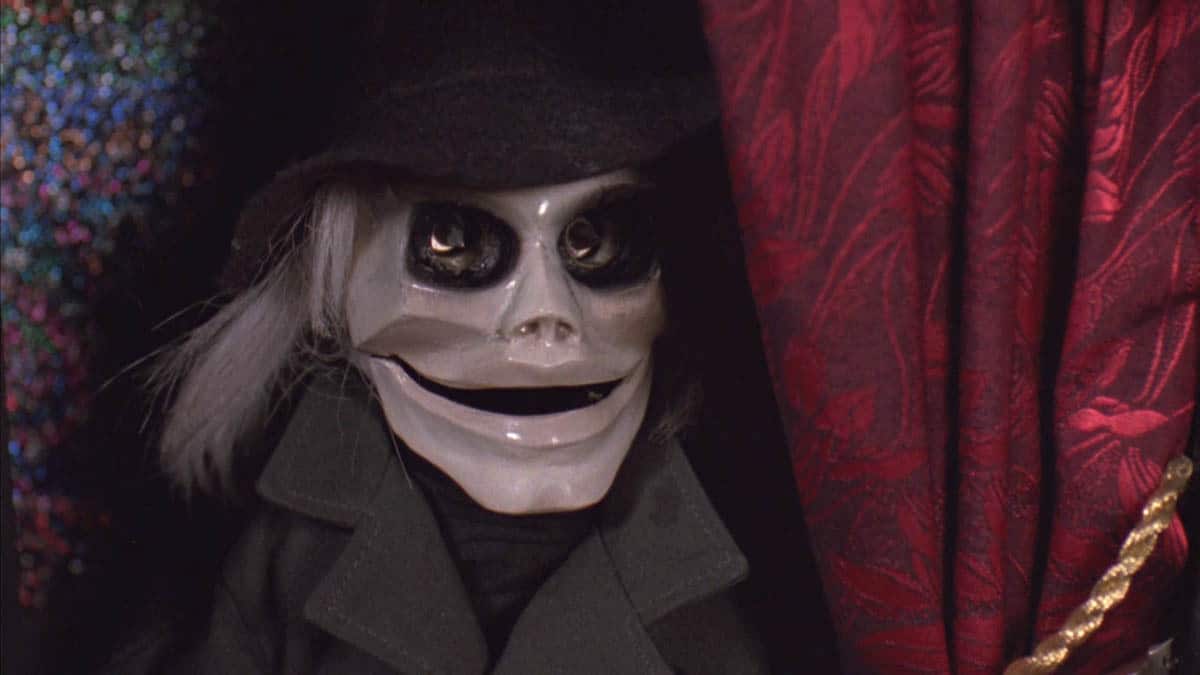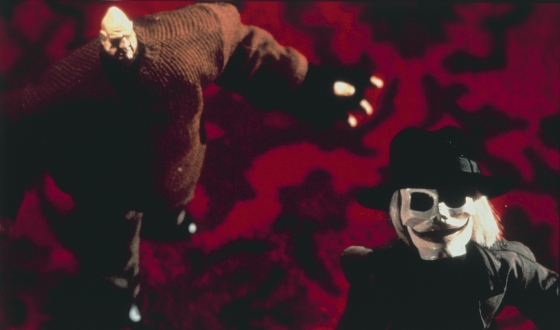10. Quicksilver Highway (1997). This is somewhere in the middle of the many, many collaborations between Stephen King and director Mick Garris. Sometimes they're great (Riding the Bullet, as you saw on the last list, was top notch. As is The Stand) sometimes they're really not great (this one, and another movie you'll see a little later on down the list) but usually they fall into that flat dead zone in the middle. Quicksilver Highway has one big thing going for it: Christopher Lloyd. This was the late 1990's when he was just starting to drift out of relevancy and he shows up here as a traveling salesman of sorts, selling terrible anthology tales. The movie claims to be "from the minds of Stephen King and Clive Barker" which sounds like the best movie ever made, but what it really means is that it's a half-handed adaptation and ultra low-budget adaptation of some of their weirdest stories ("Chattery Teeth" by King, and "The Body Politic" by Barker). An anthology of two stories is awkward, and you wind up spending the whole time looking for connections between the stories that just aren't there. Matt Frewer is entertaining as always.
09. Graveyard Shift (1990). This was the first story that Stephen King ever sold. And as a story, it's very entertaining in an EC comics sort of way. A Maine textile mill has a very serious--and deadly--rat infestation. As with so many King stories, it's a different story when committed to film. Graveyard Shift feels so completely like an old-school Charles Band movie that I'm still amazed that it isn't. The rats are weird, skinless muppets (or just rats, scuttling about--but mostly muppets) and the big "Queen Rat" needs to be seen to be believed. It also has the worst Maine accents ever committed to film, which is saying a whole lot. Brad Dourif shines in a minor role.
08. The Lawnmower Man (1992). Of all the probably hundreds of Stephen King adaptations this is the one King sued to have his name removed from. Take that in. Although, to be fair, it's mostly because the film was the result of taking two scenes from King's short story of the same name, and shoehorning them into a pre-existing and completely unrelated screenplay called "Cyber God" and then calling that an adaptation. The result is a very, very awkward movie. The bumbling idiot of the script is now a bumbling lawnmower man so that the title has relevance, while the plot revolves around a virtual reality program that can alter reality in which the idiot is king and can become all powerful. Cyber God, as a title, actually would have made sense, and then maybe this pre-James Bond Pierce Brosnan vehicle would have been somehow relevant. But taking King's name off the movie doesn't solve the issue of chimpanzees in Tron suits. Actually, the movie is a little bit wonderful, but not exactly good.
07. Dreamcatcher (2003). Stephen King has a talent for being able to put the most ridiculous shit (see what I did there?) on the page and writing it in such a way that we not only fully believe it, but it terrifies us. Dreamcatcher was the breaking point. Dreamcatcher is basically a retelling of It at a hunting lodge in northern Maine, adding an autistic boy for flavor, and replacing scary cosmic clown with aliens that come out of your poop. It's not exactly a fair trade. Morgan Freeman spends the movie wishing he was in another movie.
06. Trucks (1997). Here we have a truly special treat. One Stephen King story (and not a bad short story, at that) that actually made the list twice. "Trucks" featured in the Night Shift collection along with a slew of top-notch King stories. Trucks sticks closer to the story than its previous adaptation, Maximum Overdrive, but much like that film, the story is not the problem here. For one, the budget really, really shows. It's low and bad and no matter how many bad movies you take in, you'll feel bad for watching it. Basically, a bunch of people find themselves trapped at a gas station when 18-wheelers become sentient and decide to take over the world. Somehow, this still manages to be the second-worst adaptation of the King story.
05. The Running Man (1987). It kinda hurts. One of King's most poignant, scathingly accurate pieces of sci-fi, predating The Hunger Games in social commentary, with dead-on black humor about the nature of violence and television (it predicted a whole lot)is... turned into a loud, explosive action vehicle for Arnold Schwarzenegger. Social commentary? Punching! Hitting things! Explosions, yay! A story about a man forced to compete in mindless violence for people's entertainment is now simply mindless violence for people's entertainment. I guess Arnold gives some of his best inaudible screaming here, but it's kind of painful other than that.
04. The Mangler (1995). Oh, Tobe. Oh, how the mighty have fallen, and how far, and how fast. Tobe Hooper exploded onto the scene with The Texas Chainsaw Massacre and made something culturally iconic, and yet his second movie, Eaten Alive, was one of his worst. He's had hits and misses and movies you completely forget, but the misses make up most of it. Yet he can do it. He has it in him to do it. He's the only director to appear on both the list of best and worst Stephen King adaptations here (because he did Salem's Lot, and that was incredible), and I think that sums up his career pretty well. Point is, The Mangler is not one of his finer works. But with an evil, possessed industrial laundry machine it would have been hard for anyone to really make that work on the screen, but at least he does it in true Hooper style. When the machine starts moving around to stalk its prey, the movie really becomes a treat. Robert Englund appears under a ton of old age makeup and some random bionic legs and totally hams it up, being apparently the only person to understand what kind of movie he's in.
03. The Tommyknockers (1993). There have been a lot of Stephen King miniseries to make it to television, and many of them have had high ambition but have not quite had the budget to make the story work on film. This is one of those true rare miniseries treats to apparently have neither ambition nor budget. To say it's the worst King miniseries is nothing short of a milestone. Granted, the book is oft-malingned as King's worst, but I enjoyed it. Clearly more than the filmmakers did. Most of the plot lines from the book are completely removed, characters who appear in one or two scenes (mind you in a big book centering on a whole town) are fleshed out into primary antagonists. Seemingly made with the thought "Traci Lords seducing men with alien lipstick is clearly more important than whatever the book was about, I don't know, I didn't read it." In their half-assery they could have at least changed the ending to something more film-able. One hilarious note about the book: King wrote this tale of a struggling alcoholic at the height of his own alcoholism without ever realizing he had written it about himself until much, much later.
02. Sleepwalkers (1992). Remember up there when I talked about the frequent collaborations between Stephen King and Mick Garris? Well, with this as a starting point it's amazing they ever put together anything worthwhile at all. Sleepwalkers was directed by Garris with an original screenplay from King himself, which just completely boggles my mind. I cannot believe Stephen King wrote this movie, like, I have actual denial about it. Because there is nothing about it that works. Anyway, the story is about a couple of cat people who suck the souls out of teenagers. The cat-people are a mother and son who are 100% no questions asked romantically involved, and in a very physical son. Also, last name Bates, hardy-har-har. The movie also suggests that these soul-sucking people who both turn into cats and can only be killed by them (I know) is the origin of vampire legends, which is a little like finding out Santa Claus actually is real, but he kills cats because he's allergic and bangs his own mom.
01. Maximum Overdrive (1986.) "If you want something done right, you have to do it yourself." This is what a terrifying, coked out Stephen King says in the trailer for this movie. Yeah, side note, in addition to taking this list, it's probably the worst horror trailer of all time. Stephen King does not just narrate the trailer, he tells you everything looking right at you with those weird coke eyes and staring into your soul. Stephen King probably doesn't want to remember himself in the 80's, but man he went out of his way to make sure no one ever forgot. Anyway, this is the first adaptation of "Trucks" only it's about all machinery deciding to rise up against man at the same time (there's an unfortunate vending machine incident, in a movie that is a series of unfortunate incidents) Emilio Esteves tries to take the spotlight as leading man, but the real leading man is a big angry 18-wheeler that wears the Green Goblin's face like it just massacred a toy store. If I haven't said it already, Stephen King wrote and directed this film himself. Hell of a way to find out you're just not a director, and he has wisely directed nothing since.













